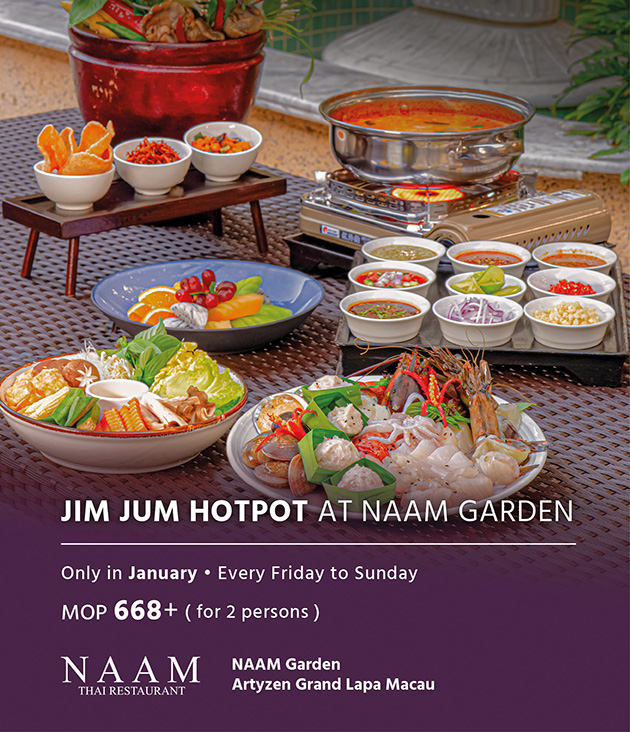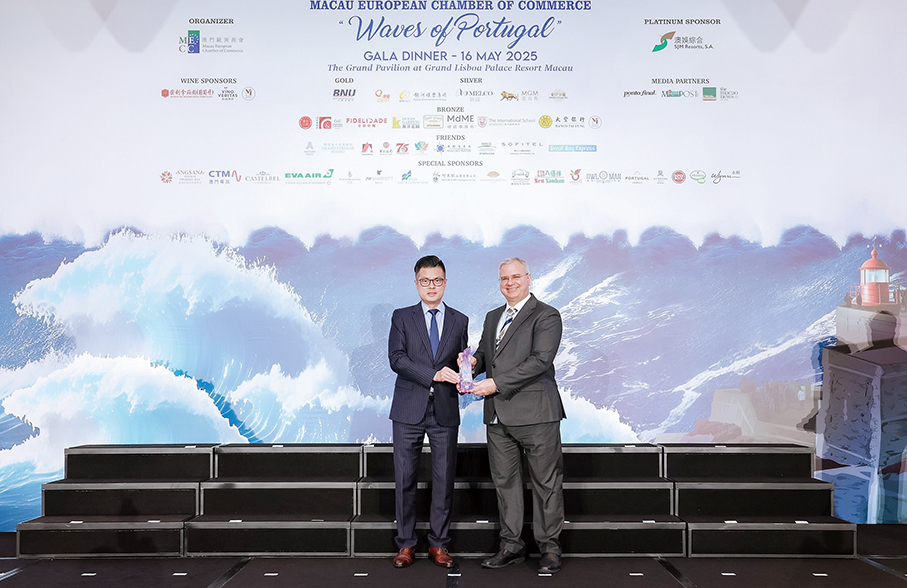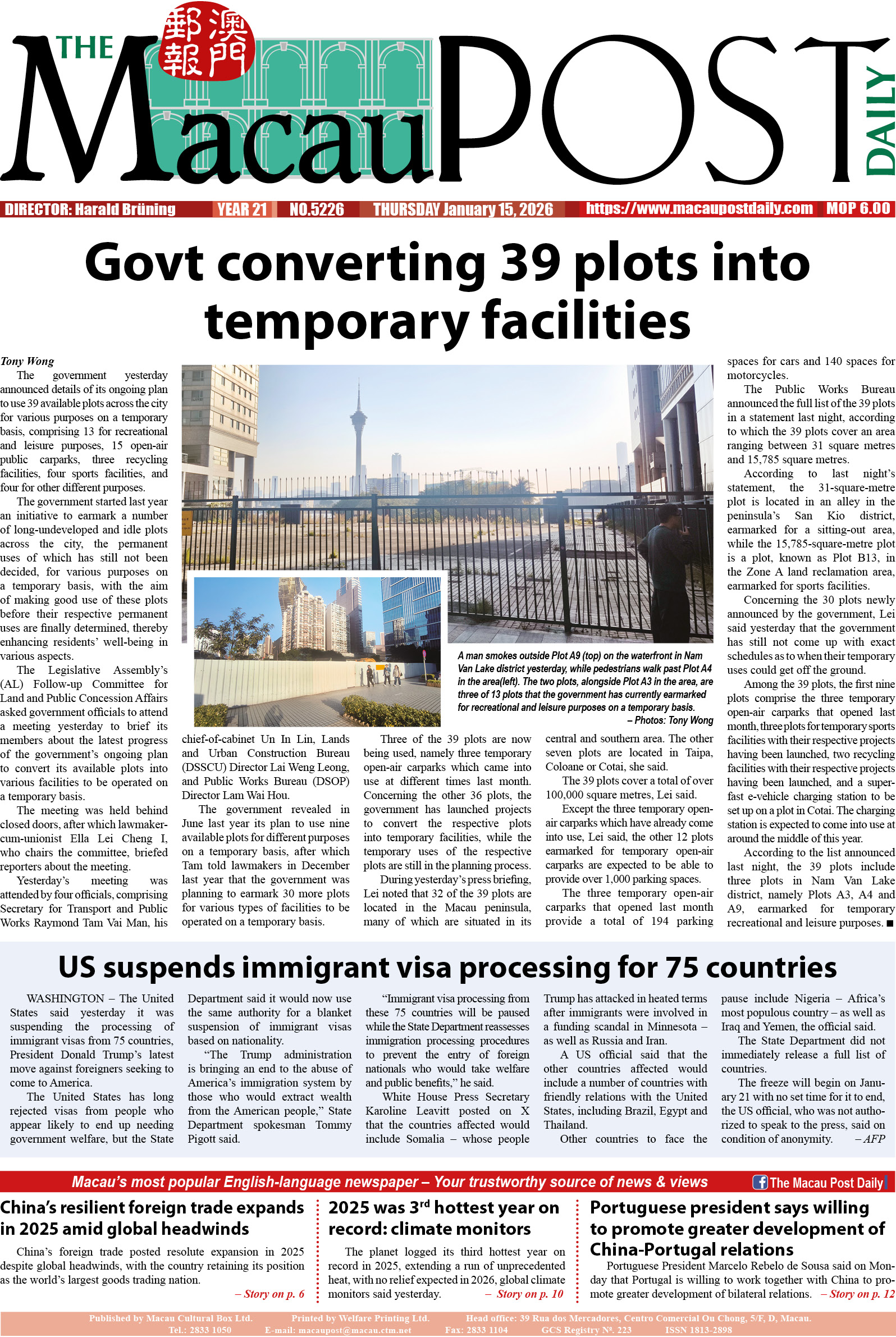Editorial
Macau’s financially indispensable gaming industry has entered a new phase at a time of great adversity – an invitation to tender.
Of course, local casino operators have been used to periods of adversity and serendipity since Macau’s then Portuguese rulers authorised Macau’s first gaming business – a fantan joint – in 1849.*
Fantan (“repeated divisions”) is played by placing two handfuls of buttons or other small objects on a gaming table and guessing the remaining count when divided by four. After the gamblers have cast bets on values of 1 through 4, the croupier repeatedly removes four objects from the board until only one, two, three or four buttons remain, determining the winner(s).
Gambling per se is a sequence of misfortune and bonne chance – it just depends on which side of a gambling table one sits. Human brains seem to be wired for gambling. The brains of both punters and gaming operators produce dopamine, a “feel-good” neurotransmitter causing excitement. Both hope to win but, apparently, even the ones who lose often remain excited as they expect to win the next time.
Not for no reason is gaming operators’ gross revenue called “win” – an ancient Germanic word meaning “gain”. Incidentally, the original Italian word “casino” is the diminutive form of “casa” (“house”), apparently because gambling houses were initially hidden in huts in bella Italia’s countryside.
Moving from etymology to history, I always found it puzzling why casinos were authorised by Macau’s Portuguese administrators in the mid-19th century, considering that Portugal is one of Europe’s most devout Catholic countries and Christianity regards gambling as a sin.
Priest-cum-historian Monsignor Manuel Teixeira (1912-2003) gave me – over a few glasses of his beloved “Scottish tea” (= whisky) – his version of the origins of Macau’s legalised gaming industry in the mid-1980s one afternoon at the S. José Seminary, where he lived among piles of books. Unsurprisingly – he was a die-hard Portuguese patriot – he blamed the British for the legalisation of casinos in Macau. Father Teixeira, as he was generally known, said that after the British seized Hong Kong with its deep natural harbour and sheltered waters, Macau’s anchorage fees quickly began to dry up and the enclave’s government was desperate to find new sources of income for its depleted Treasury. He also pointed out that later in the second half of the 19th century Macau needed to support Portugal’s impoverished half-island colony of East Timor north of Australia, and that this additional burden made steady revenues from casino concessions flowing into the local government’s coffers even more necessary than before.
Besides, British-ruled Hong Kong’s ban on casino gambling in 1871 was a godsend to Macau’s gaming industry.
Nagasaki-based Australian academic and researcher Geoffrey C. Gunn confirmed to me in a recent exchange of emails that Macau paid a yearly “subvention” to East Timor until the overthrow of the monarchy in Portugal in 1910, pointing out that Macau and Timor were administratively “twinned” as the so-called “Province of Macau and Timor” between 1866 and October 1896 when East Timor (nowadays officially known as Timor-Leste) was declared an “autonomous district” of the Portuguese colonial empire, albeit dependent in many ways upon Macau or the “metropole” (Lisbon) for financial support.**
Over the past 173 years Macau’s gaming industry has survived a litany of precarities such as the shocks of two world wars on its economy, the impact of the Chinese Civil War, gangland violence and an economic trough in the 1990s, and the dire consequences of SARS and COVID-19 on local tourism in particular.
However, Macau’s casino operators have shown a remarkable bouncebackability. I am optimistic that this will also be the case in the post-COVID-19 period when tailor-made vaccines and medicines should be able to keep the nasty virus at bay so that Macau can reopen its borders to arrivals without mandatory quarantine or other restrictions.
No doubt, the present situation triggered by the novel coronavirus is no picnic for Macau in general and the tourism and gaming industries in particular.
I had dinner at one of the resorts in Cotai on Friday followed by coffee in another one – and I was shocked by the dearth of visitors in both – with the exception of the restaurant where I had a belated birthday dinner (due, of course, to the recent COVID-19 breakout) which was packed because, I presume, it offers attractive discounts and provides delicious Macanese cuisine.
Macau’s public coffers and financial reserves have been heavily dependent on the government’s gross gaming revenue tax for decades.
Strangely enough, the systematic maximisation of the Treasury’s income from gaming taxes only became a government strategy when it signed its amended casino monopoly agreement with STDM, the gaming behemoth co-founded by Stanley Ho Hung Sun, in 1982.***
Gaming law expert Jorge Godinho has divided the history of Macau’s gaming industry into three phases – the fantan era (1849-1961), the STDM concession (1962-2002), and the current period (since 2002).**
The current period was launched in 2001/2002 by Edmund Ho Hau Wah, the first chief executive of the Macau Special Administrative Region (MSAR), whose decision to replace STDM’s four-decade-long “exclusive” casino operation with a “liberalised” system of rival gaming operators quickly turned Macau into the world’s most profitable gaming hub until the novel coronavirus started to affect local tourism in early 2020.
Last month, Macau’s gross gaming revenue (GGR) fell 95.3 percent year on year to 398 million patacas, the casino sector’s lowest takings since June 2020, according to official statistics. Month on month, GGR dropped 83.9 percent.
On July 28, the government launched a 48-day international tender for up to six gaming concessions. The tender requires bidders to focus on launching non-gaming projects and on attracting foreign tourists. It also urges the tenderers to come up with a wide range of proposals to diversify Macau’s economy. That’s a tough bet!
Economic diversification has been a political objective in Macau for decades. It was one of the first things that local government officials told me back in the 1980s when I interviewed them about the city’s economic prospects.
As a matter of fact, Macau’s economy was much more diversified at that time than nowadays. Apart from its infamous opium and coolie trade in the 19th century in particular, in the 20th century Macau ran an impressive range of industries such as the production of firecrackers, artificial flowers, garments and textiles, toys and even cameras thanks to UNCTAD’s General System of Preferences (GSP) and GATT’s Multifibre Arrangement (MFA), until a few decades ago.
In the 1980s Macau reputedly had one of the highest textile and garment outputs per capita in the world.
I am convinced that the much-desired diversification of Macau’s economy can only be achieved with the pro-active involvement of Macau’s gaming operators who are, let’s be realistic, the geese that have been laying Macau’s golden eggs for decades. Without the massive reserves generated by gaming taxes over the past two decades Macau would hardly have been able to cope rather well with the COVID-19 crisis by granting several rounds of financial aid to residents and businesses alike.
That’s why Macau’s gaming concession regime is the right approach towards tackling the challenges caused by its economic monoculture. The concessions give the government much more leeway in steering the gaming industry than conventional business licences ever could.
Figuratively speaking, one may describe Macau’s gaming concessions as a kind of public-private partnership (PPP) that ideally benefits both.
For instance, Wynn Resorts confirmed in a recent statement that by no later than September 23 it will provide a first demand bank guarantee of not less than 1.21 billion patacas “in favour of the Macau government for securing the fulfillment of its labour liabilities upon the expiration of the Concession Extension Agreement.” The US gaming operator also said that it has undertaken “to revert to the Macau government relevant gaming equipment and gaming areas” at Wynn Macau and Wynn Cotai, “without compensation and free encumbrance upon the expiration of the concession agreement term, as amended by the Concession Agreement.”
Macau’s six gaming operators inked their respective concession and sub-concession deals with the government in late June. The extended concessions expire at the end of the year.
The sextet have said that they will bid for the government’s new concessions, which are slated to get off the ground at the beginning of next year.
Local gaming consultant Carlos Lobo told Rádio Macau early this month that he expects up to 12 bidders to submit their gaming concession proposals to the government until September 14 – including the six incumbents. He also said that some of the newcomers will possibly submit their bids in conjunction with some of the existing operators. He also forecast that it’s improbable that any of the current operators will be shoved off and that, “due to the international context”, new bidders from Las Vegas will show up.
I wish all the tenderers good luck, and I expect the winners to be able to turn adversity into opportunity so that we all come out winners. What we need are solid bids, not castles in the air. And we also need their firm commitment that they will closely cooperate with the local authorities to ensure that their casinos will not be misused for money laundering, skimming and side betting.
– Harald Brüning
*Jorge Godinho, Os Casinos de Macau, História do Maior Mercado de Jogos de Fortuna ou Azar do Mundo, p. 47. Edições Almedina, 2019.
**Geoffrey C Gunn, Timor Loro Sae: 500 Years, pp. 123-55. Livros do Oriente, 1999.
*** Governo de Macau, O Jogo em Macau. GCS, 1985.







